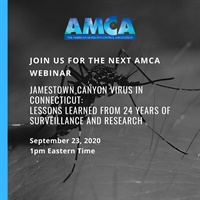Jamestown Canyon Virus in Connecticut: Lessons Learned from 24 years of Surveillance and Research
- Average Rating:
- Not yet rated
- Categories:
- Webinar Archive
- Faculty:
- Philip M. Armstrong, ScD
- Course Levels:
- All Levels
- Duration:
- 1 Hour Session
- Format:
- Audio and Video
- License:
- Never Expires.
Description
Jamestown Canyon virus circulates in a mosquito-deer transmission cycle and is broadly distributed throughout North America. Infection in humans occasionally results in neurological illness and the number of reported human cases has risen sharply in the northeastern and midwestern US during the past decade. Researchers at the Connecticut Agricultural Experiment Station have trapped and tested mosquitoes in Connecticut since 1997, and have sequenced and analyzed numerous isolates of Jamestown Canyon virus obtained during statewide surveillance. In this presentation, Dr. Armstrong will discuss major findings from these studies and explain its relevance to understanding the ecology and epidemiology of this under-studied virus.
Outline of talk:
- Intro
- Human cases and clinical manifestations
- Vector biology
- Spatial-temporal patterns of JCV in CT
- Conclusions
AMCA Members - This archived webinar along with all AMCA webinars is available free to our active members. We are currently syncing this new system with our database to have seamless identification of our members, but until that is finalized you can access all webinars (live and archived) for free using our membership code which can be found in our member portal here.
Faculty
Philip M. Armstrong, ScD Related Seminars and Products
Department of Environmental Sciences Center for Vector Biology & Zoonotic Diseases The Connecticut Agricultural Experiment Station
Virologist/Medical Entomologist
Dr. Armstrong is the Director of the Connecticut Arbovirus Surveillance Program at the Connecticut Agricultural Experiment Station and is an Associate Clinical Professor in the Epidemiology of Microbial Diseases Program at the Yale School of Public Health. His research program focuses on the eco-epidemiology and evolution of arboviruses with an emphasis on mosquito- and tick-borne viruses transmitted in the US.
